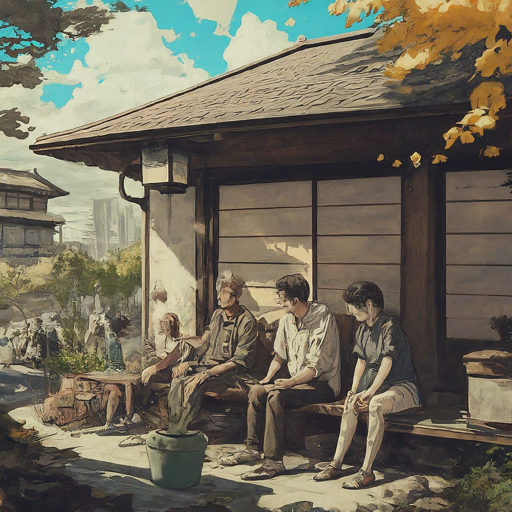I read an interesting article last week in the Japan Times reporting on a survey of Japanese people in rural areas regarding their (lack of) interactions with foreigners.
I am pasting the whole thing here to be able to reference is again in a decade:
A recent survey has shown Japanese people who reside outside the country’s major cities do not regularly interact with the foreign nationals who live in their communities, underscoring the need for Japan to work harder on integrating society.
The online survey by a research institute at Taisho University was conducted from October to November on Japanese residents in 59 cities, towns and villages across the country where foreign nationals account for 5% or more of the population. It did not include the 23 wards in central Tokyo nor the country’s 20 designated major cities.
Of the 1,194 who gave valid responses, 83.8% said they do not have regular exchanges with the foreign nationals who live alongside them.
Among the 16.2% who said they do, 39.7% said they are colleagues with non-Japanese people, followed by 32.5% who said they are neighbors with them, and 21.6% who said they have foreign friends.
Asked whether they want a higher percentage of foreign nationals in their community, 54.5% said they do not, with many citing concerns about increased friction or deterioration of the social order.
Japan has been opening up to more foreign workers to combat the slide in its working-age and overall population. As of the end of October, the number of foreign workers in Japan stood at a record high of 2.04 million, according to the labor ministry.
Professor Yuko Tsukasaki, who led the research, said that, because Japan will increasingly rely on foreign nationals for labor, it must make the country a place where they can live comfortably and build long careers.
“We must listen properly to foreign residents and make steady efforts to bring about a harmonious society,” Tsukasaki said.
Published Feb 2024. Japan Times/Kyodo. https://www.japantimes.co.jp/news/2024/02/10/japan/society/foreign-workers-limited-exchanges/
I am not especially surprised by these statistics. Foreign neighbors are often difficult for various reasons and that’s as true outside of Japan as within.
What really struck me was the naiveté in those last two paragraphs.Even though the language calls every non-Japanese “外国人” (foreigner) there is no one-size-fits-all ‘foreign resident” to build a catch-all solution for.

Here is some information about the diversity of foreigners in Japan:

NATIONALITY
Looking at the chart above, you can see that there are all kinds of people from nearby Asian countries. Americans make up a tiny part and Europeans aren’t even mentioned.
NATIVE LANGUAGE
We all speak different native tongues, most of which are not taught in Japanese schools. In the case of Chinese immigrants, they may speak any number of Chinese languages: Cantonese; Mandarin; and so on. The same applies for Europeans and Indians. The only language we have in common is Japanese – in varying degrees of fluency.
CAREERS
Immigrants range from students working part-time in retail to executives in Fortune 500 companies. There are English teachers, entrepreneurs, and real estate moguls. Many foreigners are here working in nursing, construction trades, fisheries, and other fields where Japan is short on labor.
LENGTH OF STAY
Statistics show that most foreign workers are on contracts and visas that expire after a few years. A smaller group are people who expect to stay more or less forever: ones who marry a national; obtain permanent residence; or were born here but not of Japanese parents.
We are all so different! So in what way can “foreign residents” live comfortably in harmonious society?
People with an expiration date on a contract are much less likely to get involved deeply in Japan but they can still be good neighbors. The long-term foreigners are more likely to seek ways to live comfortably combining their own culture and Japanese culture. Even then, expectations have to be set differently than “foreigners conform to Japan’s ancient society.”
In general, I see that foreign folks from all countries tend towards more individualism – especially when stripped away from their own culture. We do what we do because we want to; there’s minimal pressure to conform. Contrast that with the myriad pressures of Japanese societal groups – from participating in community maintenance to obligatory gift giving. These two ways of being clash.

What practical steps might harmonise short-term and long term expectations, with group and individualism philosophies? Here are two solid ideas I have not seen in practice yet.
- Incentivise foreigners to want to participate in their local Japanese community. There are so many types of incentives that no single one will work across the board. But incentives might combine things like financial rewards; acknowledgement and recognition; flexibility in participation; reduction of tooth-sucking by strangers; building trust and friendships; options for learning new skills; and sense of personal worth through helping.
- Assign a local mentor to interested foreigners. Sort of like a home stay family for visiting students, a local mentor takes the foreigner(s) under their wing and introduces the expectations and customs of their specific neighborhood. The mentor should be a well-regarded person living in the same kumi who knows all the helpful people and is willing to introduce them and ensure that the foreign resident has opportunity to mix and mingle. Not a sadist who forces the newcomer to do all the dirty heavy lifting for the community, though this will be hard to control because of the familiar and sometimes abusive sempai/kohai system established in schools and workplaces.

Solutions to the foreign resident issue that I have seen in place are mainly functional assistance in the form of support for tasks like visa problems, city registrations, divorce, tax and pension payments. Community groups run language lessons for newcomers and help with general life skills, but they are rudimentary (and sometimes unintentionally racist or condescending) and unlikely to turn a foreign resident into a comfortable neighbor in the long term.
So as it is now, most foreign residents flock together one way or another – sometimes in actual districts or through a shared public venue or online platform. We create ghettos of culture, language, and shared interests. Japanese can and do dip in but they tend to be people who are already international in their thinking. Not so much the grandpa next door or the mother with twins you see at the bus stop.
[Note: isn’t it interesting that in the AI generated images showing Japanese and foreigners interacting, most of the foreigners dark skinned? There’s bias in chatbots, to be sure. Can humans be better? A question for another day.]






